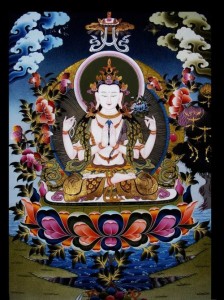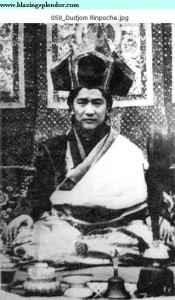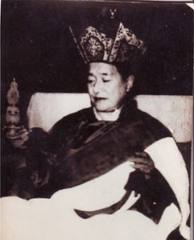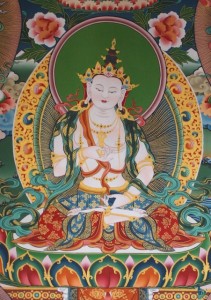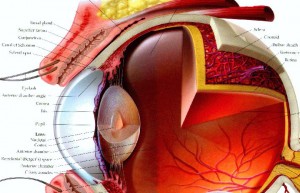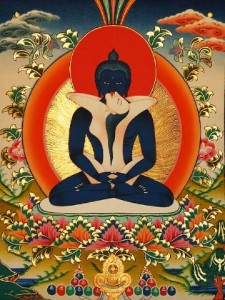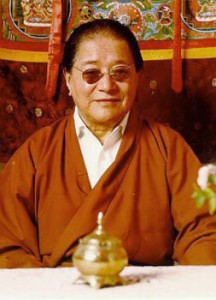
The following is from “The Lamp of Liberation: A Collection of Prayers, Advice and Aspirations”
Homage to the Guru!
Conqueror Shakyamuni, supreme guide of the universe during this fortunate aeon,
Heirs of the Conqueror, assembly of noble Bodhisattvas who
educate beings,
Revered Guru, unsurpassed protector of creatures in this degenerate time,
Together with the Three Roots, the oath-bound, and the Dharma protectors,
With yearning devotion, one-pointedly remembering you from
the depths of our hearts,
We pray again and again to invoke your attention:
Hold us with loving kindness, and by the power of your compassion,
Please bless us to accomplish our thoughts and intentions in
accord with the Dharma.
Due to former actions, by no means weak, we obtained this precious human body,
Due to merit, by no means small, we met with holy Dharma;
Accepted by the Guru, we received empowerments, blessings
and pith instructions–
Such are the jewels we hold in our hands right now!
Yet our minds, like frivolous monkeys,
Succumb to negative, deceptive demons of distraction,
And we have no ability to utilize the wealth which is our very
own.
Thus, all the instructions about the freedoms and endowments
have simply been wasted.
We are now at a crucial turning-point:
Whatever we requested, whatever we received, has all become like some kind of story;
Though our bodies appear in the posture of Dharma and we
consider ourselves as Dharma practitioners,
Our minds have not actualized the truth of Dharma.
Not knowing even a whiff of human values, let alone the view of Buddhadharma,
Having only a vague notion of the sixteen rules of proper human
conduct,
We are without conscience when we observe our bad deeds,
And our dread of being ashamed is smaller than the rear of a tail-less mouse.
Really unable to understand the ten virtuous actions of
Buddhadharma,
Full of sectarian bias, though all the doctrines come from the one Teacher,
We criticize the teachings and the sages and so accumulate bad
karma;
Thus, though relying on Dharma, we carry a great weight of sin.
Hearing a lot of teachings, our pride increases
But our mental analysis does not fathom the depth of their meaning.
Even though we think we keep the discipline of the Pratimoksha,
The four dharmas of a practitioner have been lost without a
trace.
Even though we think we possess the precious training of the
Bodhisattva,
The Four Immeasurables are only like an image of a lamp.
Even though we think we keep the samayas of the secret
Mantrayana,
The first root downfall is not guarded against and (so the rest) are
eventually discarded.
Even though we know how to voice explanations about the Four
Reflections that Reverse the Mind,
Our attachment to the appearances of this life shows there has
been no actual renunciation.
Even though we rely on a guru, our respect and devotion
gradually diminish,
And instead of having pure perception, we consider ourselves as
his equal and thus develop wrong views.
Respect, love and kindness toward our vajra brothers and sisters
decline;
Unable to tolerate a few bad words from them, we shower them
with curses.
The love and compassion generated by recognizing all beings in the six realms as our parents
Vanishes like mist when we do not practices from the depths of
Bodhicitta.
We act as though we have experienced the Development and
Completion stages,
Yet we have found no alternative to being submerged in ordinary
confusion.
We recognize that Emptiness is the ultimate teaching of both
Sutra and Tantra,
But without a decisive understanding of it our mind-streams
become hard as horns.
We are not capable of abiding in the Original Nature,
But we pay lip service to that view and throw cause and effect to
the wind.
Outwardly, we appear disciplined and well behaved, yet
inwardly, attachment, craving, desire and greed burn like fire.
Even if we keep our bodies secluded in the mountains,
Our minds stray ceaselessly, day and night, to the cities.
Not having gained confidence in ourselves in our experience and
practice,
Trying to guide others to accomplishment is like a fairy tale.
It is impossible to be cheated by the compassion of the Three
Jewels,
Yet due to a failure of devotion, we are worried and cheat
ourselves.
In this way, towards the Guru and holy Dharma,
Although we are free from the wrong views that arise from a lack
of trust,
Yet due to these difficult times, sentient beings act negatively and
remain unfulfilled,
Understanding and realization having fallen under the power of
destructive impulses;
Not having protected mindfulness and introspection, we
suffered a great loss.
The time has come to examine ourselves!
All our actions have merely added to our confusion,
All our thoughts were tainted by emotional afflictions;
Without seeing that even our virtuous activities were always
adulterated by sin,
Where is there to end up ultimately but in the lower realms?
Recalling them now, we become despondent;
Looking towards others just increases our sadness
Since we can find no beneficial friends to assuage our distress.
If we do not look after ourselves now,
Then when caught by the messengers of the Lord of Death
No one will be able to help us, and all hope will be lost.
Waiting with such empty hopes, is this not cheating ourselves?
Whatever transgressions, faults, downfalls and degeneration of the Dharma have occurred,
We will not keep secret now nor conceal them in the future,
before those who possess the yes of wisdom.
We confess from the depths of our hearts: With your compassion,
please forgive us.
Protect us from the terror of the precipice of the wrong path,
Inspire us so that we may follow the utterly pure path of
liberation.
We spent a life busy doing this and accomplishing that,
Yet we are empty-handed, without so much as a single result.
Abandoning now the path of knowing many things but
experiencing just suffering,
Why shouldn’t we enter the path of knowing the one thing that liberates everything?
Unfailing true benefactor, our sole hope and reliance,
Root Guru, who encompasses all refuges,
Praying to you with one-pointed devotion,
Most kind and revered supreme refuge, please hold us with your compassion:
Bless us to see our own faults.
Bless us to have no desire to examine the faults of others.
Bless us to pacify all turbulent, cruel and disturbing thoughts.
Bless us to have good thoughts arise from deep within.
Bless us to reduce craving and to increase contentment.
Bless us to remember that the time of death is uncertain.
Bless us to have no concerns at the moment of death.
Bless us to generate great confidence in the Dharma.
Bless us to practice impartial pure perception.
Bless us to develop uncontrived respect and devotion.
Bless us to reduce mental activity about unobtainable things.
Bless us to establish the Dharma in the depths of our minds.
Bless us to go with diligence to the depths of Dharma practice.
Bless us to liberate our mind-streams, which is the ultimate goal
of practice.
Bless us to be free of obstacles in our practice.
Bless us to have the results of our practice ripen immediately.
Bless us so that our contacts with others may be meaningful and
beneficial.
Bless us to destroy the duality of hope and fear.
Bless us to see the non-dual primordial wisdom.
Bless us to recognize the self-face of our own primordial
wisdom.
Bless us to abide in the secure place within ourselves.
Bless us to gain the great certainty without effort.
With the vast vajra weapon of primordial wisdom, which has
been present from the very beginning,
May the hollow existence of samsara and nirvana be cut in one instant.
In the ceaseless great bliss of Nyema’s celebration,
May we always enjoy the activity which is beyond union and
separation.
In the expanse of the all pervading equalness even the name
of suffering does not exist,
So who could there be still searching for happiness?
Where happiness and suffering have the same taste and grasping
is self-liberated
Is the Kingdom of Samantabhadra: May we attain it in this very life!
